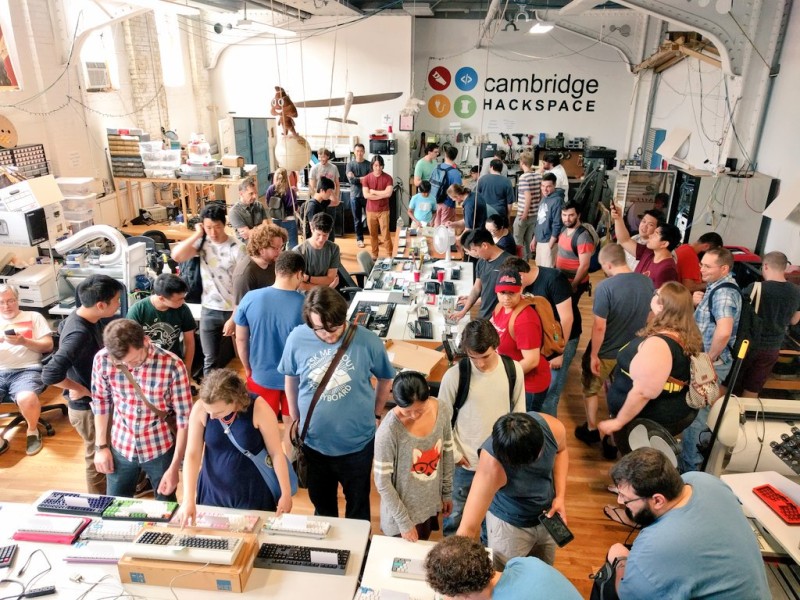Considering a career change? Here are 5 reasons why you should join a makerspace.
May 23, 2023

The winter of my biggest career change
In the winter of 2011, I found myself in the biggest career transition of my life. I had recently left my scientific research position at Harvard University to build a technology startup. No amount of education or advanced degrees could have prepared me for the change from scientist to startup co-founder. However, the one thing I discovered that catalyzed my career transition on many levels was community – an eclectic mix of makers, hackers and trailblazers. And it all started in the living room of my tiny apartment in Somerville as a meet up group.
My [then] co-founder and I wanted to meet other people who were tinkering, hacking or working on projects. Since we could not access the university makerspaces, we created a ‘community-first’ space where people can gather to talk about making, share what projects they’re working on, get advice and collaborate. We had more than 300 people register within a month! So, we had to move the event out of my living room.
The Cambridge Hackspace, or ‘Hackspace’ quickly grew into a melting pot of artists, professionals, entrepreneurs, academics and hobbyists from all over New England. People would drive to our weekly Tuesday Project Night to eagerly talk about their latest project, share other work, and get advice and tips from a helpful community.
Soon after, people began donating tools and asking us about memberships. We got organized and turned it into a non-profit. Now, we found ourselves building a startup company and a community. The community of makers would transform my career because it gave me the space to meaningfully connect with people, upskill and accelerate my learning which I immediately applied in my job and through collaborative projects. So, how can a joining a makerspace help you navigate a career change?
1. Going beyond networking during your career change
While makerspaces are fundamentally different from networking events, they still provide vast networking opportunities. But here’s the key difference: networking in makerspaces tends to be more relaxed and authentic. You’ll meet professionals, hobbyists, entrepreneurs, and creatives, providing a rich pool of contacts that can lead to job opportunities, collaborations, or simply new friendships.
2. Makerspaces foster collaboration and sharing
By nature, makerspaces are collaborative, inclusive environments where you can work on projects together, exchange ideas, and help each other overcome challenges. The diverse nature of the community brings new ideas, approaches to problem-solving, different points of views and experiences. In contrast to traditional networking, which can often feel transactional, the makerspace fosters organic, collaborative relationships based on shared passions and learning experiences.
3. Gain new skills, or enhance what you’re learning
Unlike traditional networking events that often focus primarily on conversations and connections, makerspaces are educational hubs where you can acquire practical, industry-relevant skills. These communal workspaces are filled with tools and equipment — from 3D printers and CNC machines to electronics and crafting materials — which you can use to learn, create, and innovate.
The hands-on approach promotes a deeper understanding of skills, which is far more engaging and effective compared to the passive learning in webinars or lectures. Makerspaces empower you to learn coding, robotics, design, and many other tech-related skills which are high in demand in today’s job market.
4. Makerspaces inspire creativity and innovation
Makerspaces promote a culture of experimentation, where failure is seen as a step towards success, rather than a setback. This environment encourages innovative thinking and problem-solving skills, both of which are highly sought after in many industries.
5. Provide real-world experience
Makerspaces are practical laboratories where you can work on real-world projects. It’s not just about learning; it’s about applying what you learn in a tangible and visible way. This can give you a valuable edge in job applications, demonstrating your ability to put theory into practice. This is a significant upgrade from typical networking events where demonstrations of skills are usually limited to verbal descriptions.
Final thoughts – hacking the career
A career transition or navigating between jobs can be daunting. By joining a makerspace, you can turn this challenging phase into an opportunity for growth and meaningful connections. You’re not just attendee to an event; you become an active part of a vibrant, creative community that values learning, collaboration, and innovation.
Being part of the community at Cambridge Hackspace allows me to navigate my career journey as a technology creator, entrepreneur, and product leader.
The Hackspace took a life of its own, beyond my living room to become a non-profit community led and operated organization. Volunteers take on leadership roles and manage the 1,100 square foot makerspace with a variety of fabrication tools, 3D printers, laser cutters, electronics, etc, and host a variety of events including the weekly Tuesday Project Night.

